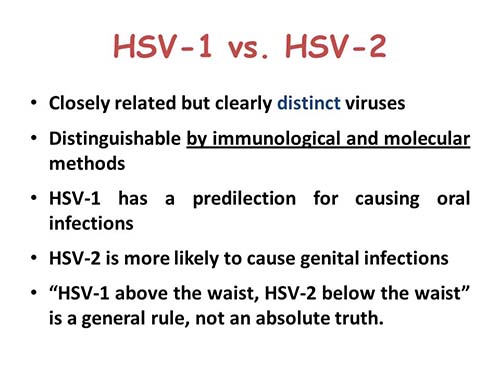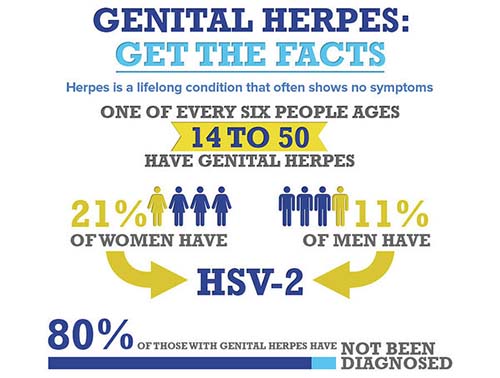Being diagnosed with herpes can be an absolute shock, and can leave you asking many questions. Many patients try to figure out exactly how they contracted the virus. Herpes is a complex and mysterious disease. While it was always assumed the virus could only pass on via active sores, recent research uncovered evidence of "silent shedding", where herpes transmits without the presence of blisters.

Patients recently diagnosed with herpes often have similar questions. The most popular questions are:
Who gave me the herpes virus?
When did I contract herpes?
How did I get herpes?
You need to know the general information about herpes before you can really answer those questions. Each one of those questions has many different possibilities, which you could find surprising.
What is the herpes virus?
Herpes has many different strains. HSV-1 and HSV-2 can cause oral and genital herpes. The virus can infect the skin and mucous membranes.
Oral Herpes
Oral herpes is a common form of herpes, which appears as cold sores near the lips and mouth. Most of the time, oral herpes is caused by the HSV-1 strain, but it can also be caused by HSV-1. Around eighty-percent cases of oral herpes are caused by HSV-1 and twenty-percent caused by HSV-2. It may be surprising, but around seventy-five to eighty percent of Americans have at least one strain of herpes.
Genital Herpes
Genital herpes is a common sexually-transmitted disease that can be contracted by either HSV-1 or HSV-2. Most of the time, genital herpes is caused by HSV-2, but oral herpes could cause it to be caused by HSV-1. Patients with genital herpes can notice sores/lesions on their genitals, thighs, and anus. However, some patients with genital herpes will not experience any symptoms.

How did I contract herpes?
The herpes virus can be transmitted by direct skin-to-skin contact. You contract herpes by touching the skin of someone who has the herpes virus. Common ways herpes is contracted includes:
Vaginal, oral, and anal sex
Kissing someone with a cold sore
Touching an area infected with herpes
You don’t have to see herpes sores to contract it. It can be transmitted at anytime, regardless if a person has noticeable symptoms or not.
Many people with with oral herpes contracted it as a child. It can be transmitted through a kiss on the cheeks, lips, and sharing a drink or eating utensil with someone with the virus. Many people with herpes will never experience an outbreak. A lot of the time, it is contracted from a family member due to the normal sharing habits that come with being a child.
Genital herpes can be transmitted via oral, anal, and vaginal sex. It is most contagious when the sores are open and moist, as the fluid from the blisters spreads the virus. However, herpes can be transmitted even when there are no sores and your skin appears to look normal.The skin on your genitals, mouth, and eyes can be infected easily. Other areas of skin may get infected if there’s a way for the herpes virus to get in, like through a cut, burn, rash, or other sores.
You can spread herpes to other parts of your body.If you touch your herpes sores and then touch your mouth, genitals, or eyes before you wash your hands, you can spread the herpes virus to that part of your body. You can also transmit herpes to someone else this way. Other areas can become infected if there is a cut, rash, burn, or other area of open skin.
The first herpes outbreak
The main symptom of herpes is painful blistering around the genital area, mouth,rectum thighs,buttocks. The first herpes infection can come with flu-like symptoms such as aches and pains. For more detail please check the article the first herpes outbreak: what does herpes look like?
How can i tell if my herpes infection is new?
The only way to know if you recently contracted herpes is to get a herpes blood test and lab culture as soon as you notice symptoms. If a culture tests positive for HSV-2 but the blood test is negative, the infection is new. This is only accurate if it is within three weeks of the first signs of infection.
You could have herpes for years without realizing it
Many people contract herpes from someone who doesn’t have sores. It could live in your body for years without causing symptoms. Your most recent outbreak could be caused by stress or other factors, which lowered your immune system, causing the outbreak.
It is difficult to pinpoint exactly when and how you contracted the virus. This is why herpes is so common. Both partners should always get tested so you know your herpes status and how cautious you need to be with sex.
80-90% of people with herpes are unaware they have it
Around eighty to ninety percent of patients with herpes are unaware they have it. The CDC reports that around eighty-seven percent of 14-19 year olds with HSV-2 infections in the United States are unaware they have it.

This is because they haven’t been tested, and many people have no symptoms. Sometimes, a patient will have herpes symptoms and mistake it for some other disease else. People may mistake herpes such as a pimple or ingrown hair in their genital region.For some people, their symptoms are very mild, so they often don't know they have the virus.
STD panels do not include a herpes test, so you need to request it specifically. Most doctors will not include a herpes blood test while testing for other STDs.
People with herpes who are unaware they have it could be having unprotected sex, transmitting the virus to partners through shedding.
Many people contract herpes from someone without sores
Herpes can live in the body for years before any symptoms appear, which is why it’s so hard to know when it was contracted. Many patients didn’t ask their doctor for the herpes test, so they could be unknowingly spreading the virus. The infection can be quite sneaky.
Every form of herpes can be transmitted, even without visible symptoms. This is referred to as “asymptomatic shedding”. This means there could be microscopic tears and fisions on the surface skin, where the herpes virus may be present. The patient with herpes can feel perfectly normal and still spread the virus.
Herpes is a very common infection
Herpes is a very common infection, and it remains in your body for life. Over half of Americans have oral herpes, and one in six has genital herpes. In fact, there are probably a few people you know with the herpes virus.
There are two factors that have contributed to the continuing issues of new transmissions. Genital herpes is common, but up to eighty-percent of patients show no signs of infection. The reactivation of genital infection happens with nearly one-hundred-percent of patients experiencing reactivation of the infection, clinically or asymptomatically.
Herpes is a manageable virus
Herpes is a common virus that could cause sores on your mouth, genitalia region, or both. While it may be annoying and painful, it doesn’t usually lead to serious health problems.
Currently, there is no cure for herpes. However, medication can ease symptoms and lower your chances of spreading the virus to your partners. Over time, outbreaks usually become less frequent. Even when it’s painful or inconvenient, it isn’t dangerous. Patients living with herpes often live normal lives, with healthy relationships and sex.
Struggling to come to terms with herpes? You are not alone
If you have been diagnosed with herpes, don’t freak out. Although there is no cure, this common virus is not life threatening, and can be easily managed. With such a large percent of the population carrying the virus, and a large percent having no idea they have it, it still confuses us why there continues to be such a large stigma with this virus. People with herpes often feel isolated. However, you are not alone. You only have to be as alone as you want to be. MIllions of people successfully live with herpes. It is not just you!

Single people with herpes should know that there are popular herpes dating websites, making it easy to find others with the herpes virus. Some of these communities like positivesingles have had an online presence for over 17 years.
Even if you don’t feel ready to date yet, it can be comforting to see the profiles of thousands of other singles with herpes who are attractive and interesting.
For those of you in a big city, there are possibly herpes support groups. These groups often have social events and activities, where members can make friends in a welcoming, safe community.
For more guidance on newly diagonsed with herpes, see the articles:
How can I find out who I got herpes from
My partner gave me herpes - did they cheat
How to have a fulfilling sex life with herpes
The first herpes outbreak: What it's like & how long it lasts
